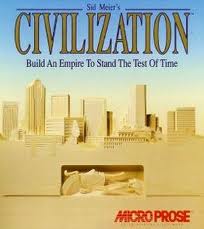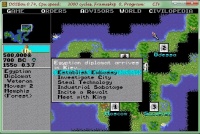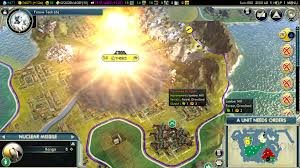Civilization (Video Game Series)
|
Civilization is a series of turn-based games created by Sid Meier and developed by Firaxis Games. Civilization V, the most recent game in the series, has sold 9 millions copies world-wide [1] Civilization, the first in its series, was first released in 1991, while the latest expansion pack edition of Civilization V, called "Civilization V: Brave New World," was released in March 2013. [2] Civilization V is available on both Mac and PC, while Civilization Revolution, released in 2008, is available on the Xbox360, PS3, Nintendo DS, and also mobile platforms such as iOS. The series has sold 40 million copies. [3]
Contents
Game Overview
The main objective of the game is to “Build an empire to stand the test of time”. Players choose a historical civilization and choose to play as a leader from that civilization. As the series has gone on, the number of civilizations has increased. The first game of the series, Civilization, offered players 14 different civilizations to choose from while Civilization V offers 34 civilizations. There are also 8 different levels of difficulty. [2]
In the most popular game mode for a single player, players pick the size of the map, the length of the game, and the difficulty level and how aggressive the computer will be. The game starts in the year 4000BC. Usually a player begins two or three units, depending on the civilization, including a settler who builds the player's the first city. After building the first city, a player has access to foreign affairs advisors, cultural advisors, military advisors, diplomatic advisors and scientific advisors. Each of them is important because they help players to build a well-balanced empire. Players can use them in order to decide which technology they want to discover, what unit or which building one wants to build in a city, or who they want to trade with. Advisors also keep players informed of diplomatic and military situations that a player may need to respond to. [4]Since Civilization is a turn-based game, the player has to wait until every other civilization ends their turn in order to make their next move. This time between turns means that games can take several hours. Civilization is known for its “one more turn” mode, which is activated after reaching the year 2050 in-game when the actual scoring game is ended. One player, Lycerius has been playing one game, in Civilization II, for over ten years. He has reached the year AD 3991. [5][6]
How to Win
In Civilization, players can win in multiple ways, such as cultural victories, diplomatic victories, conquering other civilizations, or winning the race to the moon. Here are the exact ways of winning in Civilization 5 [4]
- Cultural, achieved by completing five branches of social policies.
- Diplomatic, achieved by researching “Globalization” and constructing the United Nations. After that, all players in the game vote for the United Nations leader. The elected player then immediately wins a diplomacy victory.
- Domination, achieved by being last player in control of his own capital city.
- Science, achieved by learning all necessary technologies in order to build a space ship and moving the ship to her capital city.
- Time, achieved by having the highest score when the game ends automatically at the end of year 2050. After that, a player can still play but cannot change the result of the game.
Major Releases
| Title | Year | Note |
| Civilization | 1991 | First Civilization game |
| Civilization II | 1996 | |
| Civilization III | 2001 | |
| Civilization IV | 2005 | |
| Civilization V | 2010 | |
| Civilization Revolution | 2008 | First game developed for mobile platforms such as iOS and handheld gaming systems |
| Civilization World | 2011 | A Beta version of a game created for Facebook |
| Civilization VI | 2016 | Latest edition of the full game not including extension packs |
Ethical Issues
Violence
Civilization can be a violent computer game. Players can destroy whole cities or other civilizations with a large assortment of weapons, including nuclear weapons. Each time the user tries to conquer another player’s city, the user has an option to either occupy it or burn it. Either of these two options could be considered unethical, since war itself is not an ethical action.
It should be noted that all violence can be avoided when playing Civilization. There are ways to win the game peacefully and even form alliances with other factions so as to limit war. However, most players condone violence in Civilization as it is the quickest way to win.
Structutal Bias
The entire point of playing Civilization is to follow the user's own ambitions and seek power in a virtual world. Some critics are concerned about how games like Civilization teach people to act toward others who they share "civilizations" with in real life. Civilization largely focuses on how civilizations have been built in the fashion of the typical Western society--by developing a nation-state with an aristocracy. However other forms of civilization have existed for thousands of years. The game does not allow players to, for instance, build a nomadic society like in the Tibetan or Mongolian fashion. Instead, players must practice Dark Age "democracy" by establishing a handful of nobles who control the fates of all the common people and fight amongst themselves for more power. Players are encouraged to view the events of the game as a virtual chess where no one really matters except the king. As one article explains, in Civilization and similar games, there are no friends, only allies of convenience.[7] This has interesting ethical consequences for how players may idealize concepts of war, violence, and civil expansion, both past and present.
Cheating
Cheating is another ethical issue related to this game. One example is observed in the ethics of politics in the game. Since a player interacts with leaders of other empires, there are several opportunities to cheat or deceive these leaders. Although players can promise to help other empires by accepting a gift from other leaders, they can betray that leader at a later point on in the game. Players do this by attacking other leaders or breaking research agreements. Players can also spy on other empires. One can learn about other civilizations’ research plans, development plans or more accurate demographics. Players can also try to develop international conflicts by stealing different technologies or units. Making these unjust diplomatic decisions while playing the game raises an important question: do actions in the video game have some effect on the player's perception of, and behavior within, the real world?
See Also
External Links
References
- ↑ CivilizationV Official Site Information
- ↑ 2.0 2.1 2.2 Civ Fanatics Community [1]
- ↑ Civilization Revolution Official Site Home Page
- ↑ 4.0 4.1 Civilizaton Official Wiki Site [2]
- ↑ CNN Tech, 10-year-long video game creates a 'hellish nightmare' world
- ↑ Guardian UK, From Civilization to Big Brother: how a game recreated Orwell's 1984 It turns out that if you play Civilization II for long enough, you enter a world very much like Orwell's 1984. Coincidence?
- ↑ https://www.newstatesman.com/culture/2014/11/why-everybody-wants-rule-world


